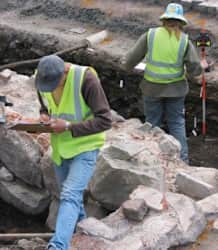To move from one place to another.
A. Historian
B. Anthropologist
C. Capabilities
D. Migrate
D. Migrate
Synonym for ritual
Ceremony
People who study the past are most like:
A. Artists
B. Builders
C. Detectives
D. Teachers
C. Detectives
Which of these activities would an archaeologist most likely do?
A. Make maps
B. Examine an object
C. Read old newspapers
D. Study earth's features
B. Examine an object.
What has been found near artwork displayed in some caves?
A. Maps
B. Masks
C. Ceremony Prayer Books
D. Lamps and lanterns
B. Lamps and lanterns
An object made by a human being, typically an item of cultural or historical interest.
Artifact
A scientist who learns about ancient people by studying the things they left behind.
Archeologist
A person who studies human society.
Social Scientist
Which of these is a human made feature that a geographer might study?
A. a cave
B. a road
C. a spear
D. a volcano
B. a road
Why do scientists think that prehistoric people used scaffolding to make their cave paintings?
Some paintings were too high to be reached from the ground.
Synonym for skills.
A. Paleo
B. Capabilities
C. Geographer
D. Archeologist
B. Capabilities
A person who studies the past through writing.
Historian
A question an archeologist might ask is:

(Answers will vary) Who lived in this place? (Who, what, when, why).
Which type of scientist is most likely to do each of these activities?
A. Make maps =
B. Examine objects =
C. Read old newspapers =
D. Study earth's features =
B. Archeologist
C. Historia
D. Geographer
Which of these cave art questions is hardest for scientists to answer?
A. Why did people paint in caves?
B. What type of paint did people use?
C. What did people paint pictures of?
D. What did people use for paintbrushes?
A. Why did people paint in caves
A scientist who studies human development and culture.
A. Anthropologist
B. Historian
C. Geographer
D. Archeologist
A. Anthropologist
A person who studies the regions of the earth through maps.
Geographer
A question that a geographer might ask is:
(Answers will vary) Questions about where things happened.
Why do historians read diaries and letters from the past?
(Answers will vary) To find out what happened and why.
What may have been a reason that ancient artists made paint from different minerals and animal fats?
To make different colors of paint.
Humans and their immediate ancestors.
Hominins
A time before written history.
Prehistoric
A question that a historian might ask:
(Answers will vary) Anything about reading/writing.
Why is studying prehistoric history difficult?
A. Written records that cannot be read.
B. Conflicting views in ancient diaries.
C. Lack of evidence from the period.
D. Huge amounts of artifacts to analyze.
C. Lack of evidence from the period.
Why did cave artists create cave paintings? What is RARELY seen in cave art?
Artists may have painted real events, just decorations, or part of hunting ritual asking for a successful hunt. Humans are rarely seen in cave art.